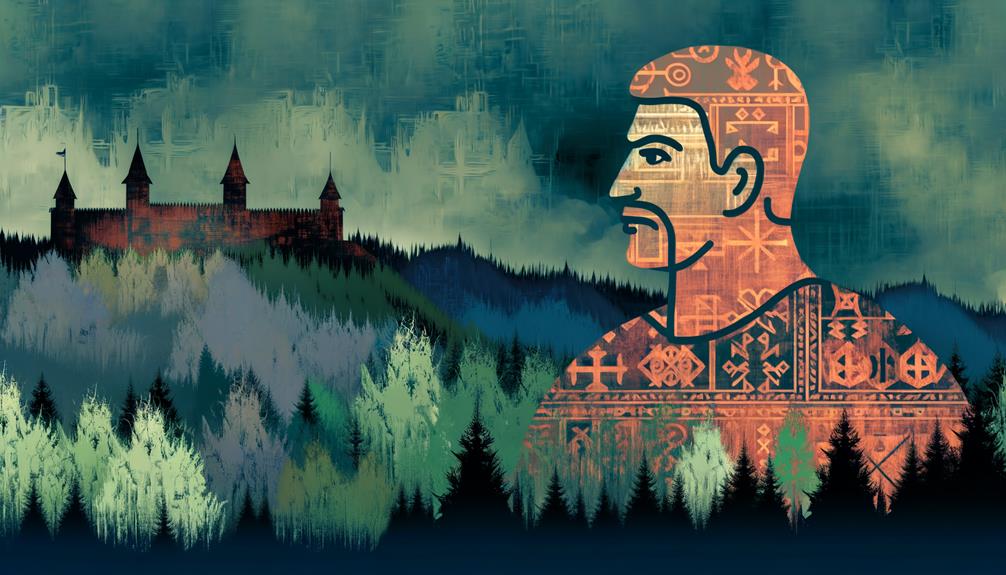Meaning of the Name Igor
The name Igor traces its origins to the Old Norse name Ingvar, combining 'Ing,' a Norse deity, and 'arr,' meaning warrior or protector. Adapted into Slavic regions, Igor signifies a divinely inspired guardian, reflecting the cultural interplay between Norse and Slavic societies.
Historically, it was prominently borne by Igor of Kiev, a grand prince of Kievan Rus', symbolizing strength, valor, and leadership. In literature and media, Igor evokes complexity and robustness.
The name's legacy is evident in various famous individuals and its cultural resonance makes it a potent symbol of resilience. To explore further into its fascinating details, continue onward.

Key Takeaways
- Igor originates from the Old Norse name Ingvar, meaning 'Ing's warrior' or 'protector.'
- Historically associated with medieval Eastern European warrior elites and royalty.
- Signifies strength, valor, and cultural heritage in Slavic traditions.
- Commonly featured in literature and media as a symbol of mystery and loyalty.
- Pronounced 'EE-gor' in Slavic languages, with variations across different cultures.
Etymology and Origins
The name Igor traces its etymology to the Old Norse name Ingvar, which is derived from the elements 'Ing,' referring to a Norse deity, and 'arr,' meaning warrior or protector. This combination signifies a person who is both divinely inspired and a guardian by nature.
The name Ingvar evolved as it traversed through various cultures and languages, particularly Slavic regions, where it was adapted into the form Igor. Linguistically, the transformation from Ingvar to Igor illustrates the influence of Scandinavian culture on Eastern Europe.
The name's etymological roots underscore a rich tapestry of mythological and cultural significance, highlighting the deep-seated reverence for warrior-like qualities intertwined with divine favor in ancient Norse and Slavic traditions.
Historical Context
Examining the historical context of the name Igor reveals its prominence in medieval Eastern European societies, particularly among the ruling classes and warrior elites. The name is deeply rooted in the socio-political fabric of the region, reflecting its significance in various historical settings.
- Kievan Rus': Igor was prominently borne by Igor of Kiev, a grand prince who reigned in the early 10th century, underscoring its association with leadership.
- Varangian Influence: The name's Scandinavian origin highlights the cultural intermingling between Norse and Slavic peoples.
- Military Prowess: Frequently linked with warriors, the name signifies strength and valor.
- Dynastic Lineages: Employed within ruling dynasties, it symbolizes continuity and heritage.
These aspects illustrate the name Igor's historical depth and enduring legacy.
Cultural Significance
The name Igor, with its deep Slavic historical roots, has been prominently featured in various cultural contexts, especially in literature and folklore. Its presence in modern day usage reflects both a continuity of tradition and an adaptation to contemporary naming practices.
Understanding these aspects offers insight into the enduring significance of the name Igor across different eras and regions.
Slavic Historical Roots
Understanding the cultural significance of the name Igor necessitates an exploration of its origins within Slavic history. The name Igor is deeply rooted in Slavic traditions and carries historical weight. Originating from the Old Norse name Ingvarr, it was introduced to the Slavic regions during the Viking Age. The name Igor gained popularity among Slavic people and became associated with a sense of strength and power. It also holds significance in Russian literature and folklore, often representing a heroic and noble character. When discussing the cultural significance of names, it is important to consider their historical and religious connotations. For instance, the biblical significance of the name Enoch is rooted in the story of Enoch, who was said to have been taken by God and walked with him, symbolizing a deep connection to the divine. This highlights the interconnectedness of names with historical, cultural, and religious contexts.
The name Igor has several cultural connotations:
- Royalty and Leadership: Historically associated with rulers, such as Igor of Kiev, a notable figure in early Eastern Slavic history.
- Valiant Warrior: Symbolizes strength and bravery, revered in Eastern European folklore.
- Orthodox Christianity: Frequently used in Christian contexts, reflecting the region's religious heritage.
- Cultural Identity: Represents a connection to Slavic ancestry and cultural pride.
These elements underscore the name's enduring relevance in Slavic heritage.
Influence in Literature
How has the name Igor influenced literature and contributed to its cultural significance throughout the centuries? The name Igor has permeated various literary works, symbolizing strength, mystery, and complexity. It first gained prominence in medieval Slavic epics and legends, such as "The Tale of Igor's Campaign," which depicted the valor and struggles of Prince Igor. In modern literature, authors often employ the name Igor to evoke a sense of depth and gravitas.
| Literary Work | Significance of Igor |
|---|---|
| "The Tale of Igor's Campaign" | Heroic and historical epic |
| "Frankenstein" by Mary Shelley | Igor symbolizes loyalty and servitude |
| Russian Folk Tales | Represents common folk hero |
| "The Master and Margarita" | Mysterious and complex character |
| "Dracula" by Bram Stoker | Igor as a symbol of dark mystique |
This recurring use underscores the name's enduring impact on cultural narratives.
Modern Day Usage
In contemporary contexts, the name Igor continues to carry significant cultural weight, often associated with traits such as resilience, loyalty, and enigma. Its usage spans various domains, reflecting a rich tapestry of cultural significance:
- Literature and Film: Igor is frequently depicted as a mysterious and loyal character, often serving pivotal roles in narratives.
- Music: Influential musicians, such as Igor Stravinsky, have contributed to the name's enduring legacy within classical and modern genres.
- Sports: Athletes named Igor, particularly in Eastern Europe, symbolize strength and determination.
- Politics and Leadership: The name is prevalent among notable figures in politics and leadership, reinforcing its association with power and influence.
Thus, the name Igor remains a potent symbol across diverse fields.
Famous Namesakes
Among the most renowned individuals bearing the name Igor is the illustrious Russian composer Igor Stravinsky, whose innovative contributions to music have left an indelible mark on the 20th century.
Stravinsky's works, such as 'The Firebird,' 'Petrushka,' and 'The Rite of Spring,' revolutionized classical music with their complex rhythms and bold harmonies.
Another prominent namesake is Igor Sikorsky, a pioneer in aviation engineering. Sikorsky's invention of the first practical helicopter, the VS-300, in 1939, significantly advanced aeronautics.
Additionally, Igor Tamm, a Soviet physicist and Nobel laureate, made groundbreaking contributions to the field of theoretical physics, particularly in the development of the tokamak, a device essential for controlled nuclear fusion research.
These figures exemplify the name Igor's association with innovation and excellence.
Variations and Pronunciations
Not only has the name Igor been borne by notable figures, but it also has various linguistic adaptations and pronunciations across different cultures. In Russian and Slavic languages, Igor is pronounced as 'EE-gor.' However, other cultures have adapted the name, leading to slight variations:
- Scandinavian: Pronounced as 'EE-gor,' similar to the Slavic version but with a softer 'r'.
- French: Pronounced as 'Ee-ZHOR,' where the 'g' takes a softer, more 'zh' sound.
- Portuguese: Pronounced as 'EE-gor,' maintaining the original Slavic pronunciation.
- Spanish: Pronounced as 'EE-gor,' with minor regional differences in intonation.
These variations exemplify the name's adaptability, reflecting its widespread cultural resonance and phonetic flexibility.
Popularity Over Time
The name Igor has experienced fluctuating levels of popularity across different regions and historical periods. Originating from Old Norse and Slavic roots, Igor gained prominence in Eastern Europe, particularly in Russia and Ukraine, during the medieval era.
The name's usage surged during the 10th century with the reign of Prince Igor of Kiev. In the 20th century, its popularity extended beyond Eastern Europe, influenced by notable figures such as composer Igor Stravinsky. However, the name's appeal varied notably over time and across geographies.
Statistical data from various countries show that while it remained relatively common in Slavic nations, its prevalence diminished in Western Europe and North America, reflecting broader cultural and migratory trends.
Modern Usage and Trends
In contemporary contexts, the name Igor has experienced varying degrees of popularity influenced greatly by media portrayals and cultural trends.
Geographic name trends reveal that while Igor remains relatively common in Eastern European countries, its usage in other regions shows a declining or niche pattern.
This section will explore these phenomena, providing insights into how modern media and geographic factors shape the current standing of the name Igor.
Popularity in Media
Amidst evolving cultural narratives, the name Igor has garnered attention through its representation in contemporary media and popular culture. This presence is notable in various domains:
- Literature: Igor appears as a character name in numerous novels and short stories, often embodying diverse traits and backgrounds.
- Film and Television: The name is frequently used in both mainstream and independent productions, contributing to its recognition and appeal.
- Music: Notable musicians and bands have adopted Igor either as a stage name or within lyrical compositions, further embedding it in the cultural zeitgeist.
- Video Games: Characters named Igor feature prominently in popular gaming franchises, enhancing the name's visibility among younger audiences.
These instances collectively underscore Igor's evolving role in modern media.
Geographic Name Trends
Across various regions, the name Igor exhibits distinct trends and patterns reflective of cultural and social influences.
In Eastern Europe, particularly in Russia, Ukraine, and Poland, Igor remains a popular and traditionally significant name, often associated with historical and literary figures.
Conversely, in Western Europe and North America, the name Igor is less common, occasionally perceived through the lens of popular culture and media portrayals.
In Latin American countries, its usage is sparse yet growing, influenced by increasing cultural exchanges.
The name's Slavic roots and robust phonetic structure contribute to its enduring appeal in specific locales, while global mobility and media continue to shape its modern usage and perceptions, illustrating a complex interplay of tradition and contemporary trends.
Conclusion
The name Igor, imbued with a rich etymological heritage and steeped in historical significance, stands as a moniker of profound cultural resonance.
Its various pronunciations and international adaptations underscore its enduring global appeal.
Across the annals of time, Igor has been borne by illustrious figures, solidifying its place in the pantheon of notable names.
The ongoing popularity and modern usage of Igor attest to its timeless charm and indomitable presence in contemporary nomenclature.






